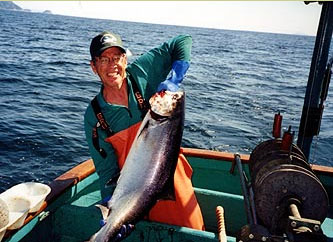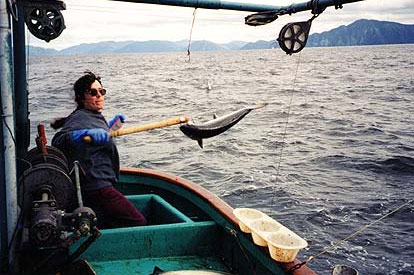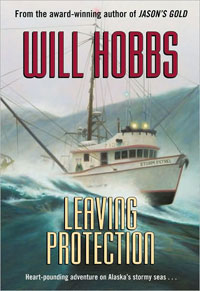|
||||||||||||||||||||||||||||||||||||||||||
 |
No way. From book research, I could only have picked up about half of the knowledge required, and none of the sensory impressions that I need to draw upon to see these scenes in my imagination.
What was it like, working on the fishing boat? Was it hard work? Oh, man. Fifteen hours a day’s worth. My job was to clean and ice the fish, and I really got worked. It was a great feeling. I’ve done quite a bit of physical labor in my life, building houses, stuff like that, but the only thing to compare with this was six weeks I spent picking fruit in Idaho when I first got out of college. How long have you been into fishing? From the age of nine, in Alaska. We lived at Elmendorf Air Force Base, outside of Anchorage. My dad would take us fishing on the Kenai River. Most of my fishing since then has been on backpacking trips into the high country of southwestern Colorado, where I live. Salt water fishing and commercial fishing were new to me when I worked on the Julie Kristine, off of Prince of Wales Island in southeast Alaska, in July 2002. Did you work on the boat for the experience, or so you could get ideas for a novel? For the experience! On a number of previous trips to southeast Alaska, I’d fallen in love with the picturesque salmon trollers, and always imagined what it must be like to work on one. When a teacher on Prince of Wales Island, Julie Yates, invited me to work with her and her father on his troller, I jumped at the chance. George Yates is in his fourth decade of trolling, and I was lucky enough to get in on his most productive king salmon season in years. (Check out the photo of Julie gaffing a king salmon, and the one of me holding up a really big one.) Many of my adventures in the outdoors come and go without suggesting a story, but I came home from this one with a strong desire to write a novel, and I found a way to make it happen.
It must have been one of your easier novels to write. Did you just sort of reel it in? I wish. This was novel number fifteen, and they never get easier. Each one seems to have its own rules. If I hang in there long enough, I can eventually discover them. I started out writing Leaving Protection as a fishing story, pure and simple, featuring a deckhand, a skipper, the dynamic between them, the fishing, and the weather. After trying it from several different angles, and getting no farther than four or five chapters, I realized it lacked some other dimension that would add interest for me and the reader. I needed something that would intensify the tension between Robbie, the deckhand, and Tor, his skipper. So you started over, and early on, you had Robbie accidentally discover the Russian possession plaque on Tor’s boat. That’s where the suspense begins, and the mystery. That’s when I knew I’d hooked a story, one that should hook the reader. How far back does that go, your interest in the history of the Russians in Alaska? Back to my childhood in Alaska, seeing those exotic Russian churches and cemeteries. But it really heated up in May 2002, when my wife and I visited Sitka, the capital of Russian Alaska, and toured the historic sites there. In the museum at the Bishop’s House, I saw a facsimile of the only possession plaque ever found, one of twenty. So I had that to draw on when I needed that missing element that would make the story go. For years, I had been reading about the history of the Russians in Alaska, so I had quite a bit to draw on that I was already familiar with. Leaving Protection is “adventure-plus.” Reading it is a thrilling ride, but the reader learns a lot along the way: the details of the salmon fishing, the trouble that commercial salmon fishermen are in because of salmon farms, the Russian history, the savage storms that come up in the Gulf of Alaska, even the mechanics of giant waves in Lituya Bay. There must have been a lot of research behind this book. Tons. I especially enjoyed calling up my fishing friends in southeast Alaska, to make sure I got the details right. I wanted to make the story as authentic as I possibly could. Is there really a tiny fishing community called Port Protection on the northern end of Prince of Wales, that’s accessible only by sea and by floatplane? Yes, and there’s a second one, Point Baker. A Point Baker family I met—Joe and Joan Sebastian and their kids, Forest and Elsa—inspired Robbie’s family in the novel. Like the Daniels, the Sebastians fish the inside waters, in their classic 1937 troller, the Alta E. Will you be going back to Prince of Wales Island? Early and often, I hope. I love it up there, the people and the place. |
|




